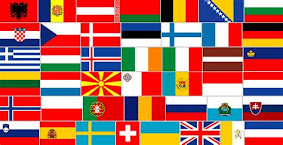by Kevin Scott
The dust has just about settled following last week’s EU elections and the clear winner in the UK is Nigel Farage’s Brexit Party, winning 29 seats with 31% of the vote.
Both the two main parties have seen their support slump, with the Lib Dems (16 seats) beating Labour (10 seats) to second place, while the Greens (7 seats) pushed the ruling Tory party (4 seats) back into fifth place.
An illuminating diagram below shows who finished top of the poll in each council district across mainland UK. Scotland (and Ulster) is a different country, while Plaid did well in Wales, though it has a long way to go before it matches the SNP’s electoral dominance in Scotland.
Both the Tories and Labour are in big trouble over Brexit. The former with its own voters, the latter with its own members. If the Brexit Party is still around by the time the next general election is called (by 2022 at the latest) and the UK is still in the EU, then the Tory vote could easily split and allow Jeremy Corbyn into Downing Street, assuming internal disputes over a second (rigged) referendum are resolved, when voter turnout will be much higher.
One of the big losers was UKIP, who were wiped out losing all their remaining MEP seats. Their best showing was in the north east of England, where they polled 6.2%, just behind the sinking Tory party on 6.8%.
The English Democrats standing in a handful of English regions also failed to make an impact and is now a mere hobby horse, unable to gain any traction and hobbled by a lacklustre leadership.
In the north west of England, ‘Tommy Robinson’ certainly made an impact, but failed to generate enough votes to get himself elected winning 38,908 votes, a poor 2.2% vote share, when he needed 8/9% to grab one of the eight seats in the region.
‘Tommy Robinson’ needs to forget about electoral politics and concentrate on what he does best – galvanising and building support on the streets and reminding the middle class fake left and ultra-liberal snowflakes that the white working class still exists.
It seems likely his brief association with UKIP will also be terminated,
Despite recent local election gains in places like Sunderland and Burnley, UKIP itself will struggle to stay relevant after the Brexit Party’s thumping victory. It will also struggle to keep going as an effective campaigning force and it seems likely Gerard Batten’s leadership will be challenged, assuming he doesn’t resign beforehand.
With UKIP out of the way, the Nigel Farage wrecking ball could prove very handy to any new or insurgent party that can campaign in an effective manner at a local level, assuming the Brexit Party itself stays away from local elections.
With the parliamentary by-election in Peterborough on the 6th of June, the Brexit Party bandwagoon looks likely to cause even more damage to the old parties as the Brexit revolution continues apace due to the failure of the bourgeois liberal Westminster political class to deliver the promised exit from the EU.
Also published at Civil Liberty
The dust has just about settled following last week’s EU elections and the clear winner in the UK is Nigel Farage’s Brexit Party, winning 29 seats with 31% of the vote.
Both the two main parties have seen their support slump, with the Lib Dems (16 seats) beating Labour (10 seats) to second place, while the Greens (7 seats) pushed the ruling Tory party (4 seats) back into fifth place.
An illuminating diagram below shows who finished top of the poll in each council district across mainland UK. Scotland (and Ulster) is a different country, while Plaid did well in Wales, though it has a long way to go before it matches the SNP’s electoral dominance in Scotland.
 |
| The electoral map of mainland UK following the 2019 EU elections. |
Both the Tories and Labour are in big trouble over Brexit. The former with its own voters, the latter with its own members. If the Brexit Party is still around by the time the next general election is called (by 2022 at the latest) and the UK is still in the EU, then the Tory vote could easily split and allow Jeremy Corbyn into Downing Street, assuming internal disputes over a second (rigged) referendum are resolved, when voter turnout will be much higher.
One of the big losers was UKIP, who were wiped out losing all their remaining MEP seats. Their best showing was in the north east of England, where they polled 6.2%, just behind the sinking Tory party on 6.8%.
The English Democrats standing in a handful of English regions also failed to make an impact and is now a mere hobby horse, unable to gain any traction and hobbled by a lacklustre leadership.
In the north west of England, ‘Tommy Robinson’ certainly made an impact, but failed to generate enough votes to get himself elected winning 38,908 votes, a poor 2.2% vote share, when he needed 8/9% to grab one of the eight seats in the region.
‘Tommy Robinson’ needs to forget about electoral politics and concentrate on what he does best – galvanising and building support on the streets and reminding the middle class fake left and ultra-liberal snowflakes that the white working class still exists.
It seems likely his brief association with UKIP will also be terminated,
Despite recent local election gains in places like Sunderland and Burnley, UKIP itself will struggle to stay relevant after the Brexit Party’s thumping victory. It will also struggle to keep going as an effective campaigning force and it seems likely Gerard Batten’s leadership will be challenged, assuming he doesn’t resign beforehand.
With UKIP out of the way, the Nigel Farage wrecking ball could prove very handy to any new or insurgent party that can campaign in an effective manner at a local level, assuming the Brexit Party itself stays away from local elections.
With the parliamentary by-election in Peterborough on the 6th of June, the Brexit Party bandwagoon looks likely to cause even more damage to the old parties as the Brexit revolution continues apace due to the failure of the bourgeois liberal Westminster political class to deliver the promised exit from the EU.
Also published at Civil Liberty




























